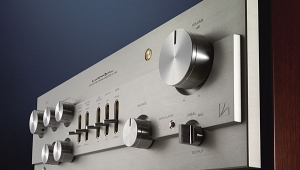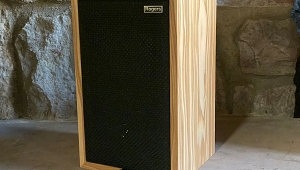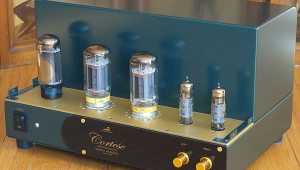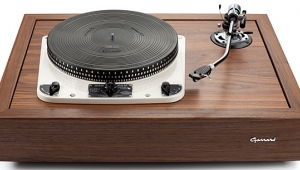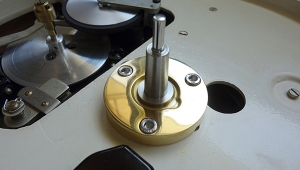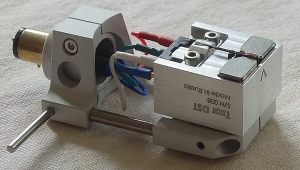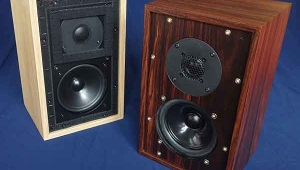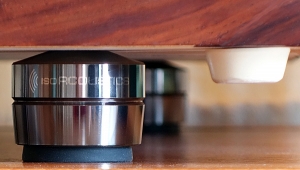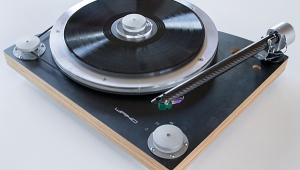| Columns Retired Columns & Blogs |
Listening #1 Page 2
Here's a Maserati Spyder Corso (I live in Saratoga Springs, remember), total sticker price $100,150. This irrationally pretty thing is finished in vibrant blue with a rust-red leather interior, a color scheme not unlike that of the Eastern Bluebird. The heated interior is an $1100 option, and another $3000 or so of the final price is accounted for by the gas-guzzler tax this 11mpg beauty commands. I catch a glimpse through slotted wheels of brake calipers painted bright red, an option that alone adds more than $400 to the price.
Do I need this car? Of course I do.
Well, probably not. My '93 Saab still runs alright, notwithstanding 127,000 miles on the odometer that weren't there 10 years ago and some rust at the bottoms of the doors. I tend not to drive it out of town—that's for the Subaru Forester, which is having its crankcase overfilled with motor oil as I write this. Given the driving that I do, which is limited mostly to preschool and the post office, my car is sufficient. I suppose.
Here's a different question: Even though I don't need a Maserati Spyder Corso, would owning it improve the quality of my life?
Certainly. I would get more enjoyment out of driving, thus I would raise the quality not only of my own life but also of those friends and neighbors whom I would take on their errands, daily if not hourly. I would be inspired to travel farther, adding breadth and color to my impoverished worldview. I might also be safer (new airbags, etc.), and there's a chance I'd make some new friends. In short, I would have a better time. Anyone can see that.
Now here's the big question: Where are the Maseratis of hi-fi? Where are the products whose performance and craftsmanship can be appreciated by virtually anyone? Where are the products that are so staggeringly well-designed and well-built that to say "I need it" seems almost reasonable?
Hmmmm...My own very short list would include the Linn Sondek CD12 CD player, the Audio Note Ongaku amplifier, and maybe one or two other things. But what characterizes those sorts of products—and the reason I like them and covet them—is that they play music better than the things I already have. Musical ability is different from deep bass or holographic imaging or the other sorts of things that can impress almost anyone just a few seconds into the first song. Music is easy to miss for the listener who thinks his job is to concentrate on the sound.
That Maserati goes faster, handles better, stops more efficiently, looks nicer, and in general does a superior job of attracting young women as compared with more affordable automobiles—and it does all that to a degree that is not subtle or difficult to appreciate. You don't have to think, and, just as important, you don't have to work at not thinking: You just drive and wave and smile at the people in the next lane.
This is why, when it comes to home audio, people are satisfied with what they have. Most people think it would be hard to go back to their Ford Escorts and Honda Accords after driving something like that Maserati Spyder Corso—and I'm sure they're right. But most people don't feel the same way about the difference between a world-class hi-fi and a Sony Walkman, and that's the problem. In a world where overtly bad sound has mostly been banished, selling hi-fi is tough, because what we're down to now is selling music—and no one seems to know how.
No bad cartridges!
At the end of the day, it doesn't matter how many Maseratis I have, because as far as hi-fi is concerned, I'm more interested in things that are a little lower on the price ladder—not because I'm altruistic (although I am), but because 17 years of writing about audio have left me believing that most ultra-expensive turntables, amps, speakers, and even cables are junk. Even the ones that sound good are usually incapable of doing what I expect from a hi-fi: emit a string of notes and beats convincing enough that I can mistake it for music.
Notice that I left phono cartridges off that list. Although they all sound a little different from one another, I like most of the cartridges I hear these days, even the very expensive ones.
Why are there no truly awful ultra-high-end phono cartridges, while there are scads of unlistenable megabuck amps? Because a cartridge, by its nature, must be made small and simple: The poor thing has to fit at the end of a tonearm, and it can't weigh much more than 10gm—meaning there's no room for designer parts or a laser-etched faceplate or electrical connectors that were intended for a nuclear-powered MIG-welder. Thus, in the constrained world of phono-pickup design, money can either go toward something worthwhile (silver wire, radical stylus tip, hand-tuning, etc.) or toward nothing at all. Forgive my cynicism, but I'd rather see $9000 of a $10,000 product go straight into its designer's pocket: There, at least, it can do no harm to the product itself.
- Log in or register to post comments

